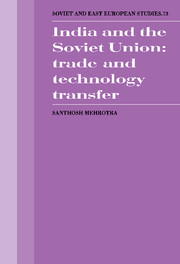9 - Conclusions
from PART III
Published online by Cambridge University Press: 04 August 2010
Summary
The Soviet planning experience deeply influenced India's planners in the fifties, both in regard to their commitment to planning and to the particular strategy of planning. Although an assessment of the precise extent of Soviet influence on the strategy adopted in India's Second Plan (i.e. ‘heavy-industry first’) would be of interest to a student of the history of economic thought, it is outside the scope of this study. The available evidence suggests that Mahalanobis was fairly impressed with Soviet thinking on industrialisation.
Soviet and east European economic/technical assistance and Indo-east European trade played an important role in implementing the chosen planning strategy. The Mahalanobis strategy neglected the role of foreign trade, and from 1950 to 1969 India's total exports did not expand much. However, over the same period, Indo-east European trade expanded very rapidly due to bilateral trade and payments agreements. Bilateralism created secure markets for India's traditional exports, producing the purchasing power for India to import plant and machinery to implement the chosen import-substitution strategy in certain sectors.
In the seventies and eighties the macro-economic role of Indo-Soviet trade and Soviet aid in India's economy has been changing. Given the near absence of fresh aid authorisations by the USSR in the seventies and the changing structure of trade, the continuing macro-economic significance of the Indo-Soviet economic relationship consists increasingly in alleviating the balance of payments difficulties of the economy.
- Type
- Chapter
- Information
- India and the Soviet UnionTrade and Technology Transfer, pp. 207 - 216Publisher: Cambridge University PressPrint publication year: 1991



